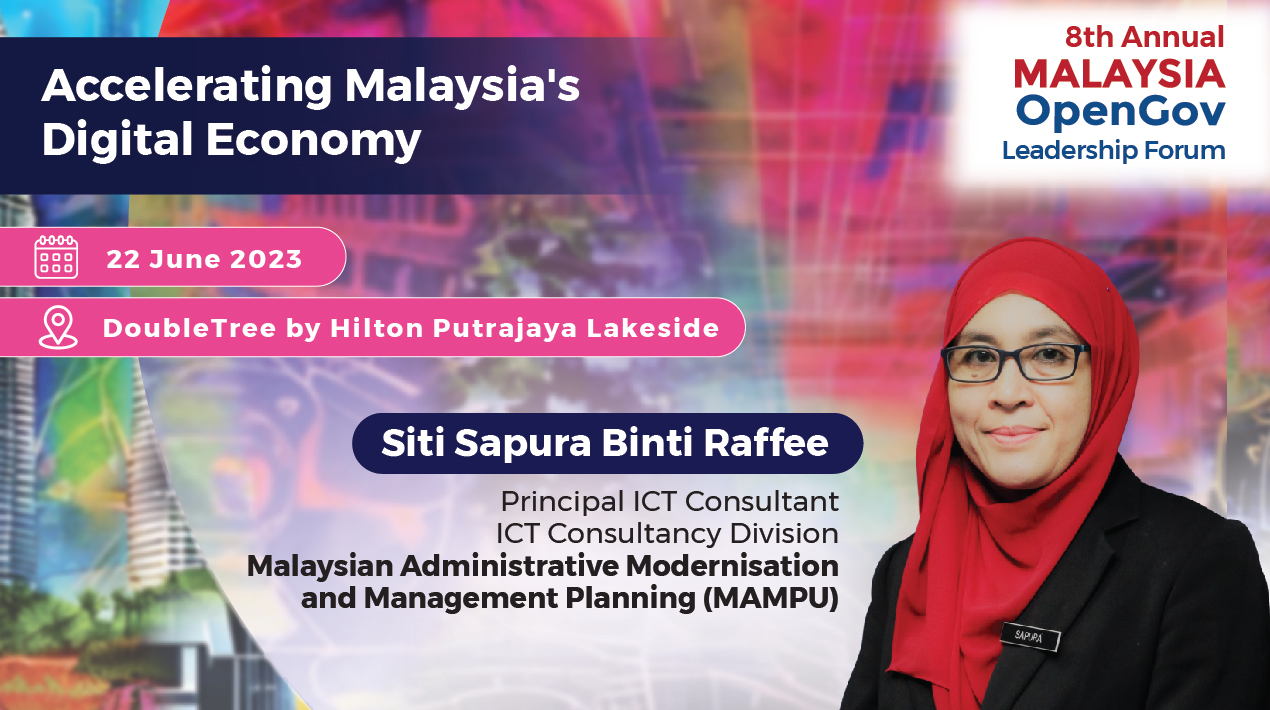
8th Annual Malaysia OpenGov Leadership Forum 2023: Insights from the Opening Address
This is a three part series. Read Part I and Part II here.
OpenGov Asia held its 8th Leadership Forum in Malaysia at the DoubleTree by Hilton Putrajaya Lakeside on 23 June 2023. Siti Sapura binti Raffee, the Principal ICT Consultant (Strategist) at the Malaysian Administrative Modernisation And Management Planning Unit (MAMPU) delivered the opening address.
Part I of OpenGov Asia’s coverage of her speech noted the focus on the role of a digital government in shaping a robust digital economy ecosystem in Malaysia, highlighting the need for comprehensive strategies and stakeholder involvement.
Part II covered how Malaysia is actively pursuing digital government initiatives, focusing on policies, roadmaps, and strategic plans to enhance the digital economy, bridge the digital divide, and provide efficient online services to citizens.
Looking ahead
Despite the Malaysian government’s strong commitment to public sector digital transformation, there are several challenges that need to be addressed. These challenges include improving institutional coordination, enhancing citizen-centric service design, promoting citizen engagement, ensuring system interoperability, facilitating data reuse, promoting transparency, encouraging open data practices, and focusing on digital skills development.
Overcoming these challenges will contribute to the successful implementation of digital initiatives and the realisation of a more efficient and citizen-focused digital government.
To accelerate the Malaysia digital economy, the public sector must embrace emerging technologies such as Robotic Process Automation (RPA), Artificial Intelligence (AI), Blockchain, Big Data Analytics, Internet of Things (IoT), and Cloud Computing. These technologies enable automation, intelligent decision-making, secure transactions, data analysis, connectivity, and scalability. Adopting these technologies will drive innovation and enhance service delivery in the public sector.
The ongoing development of the National Digital ID (IDN) is a significant initiative that benefits both the government and citizens. Implementing the IDN will enhance citizens’ quality of life, add value to various service sectors, improve efficiency, reduce operational costs, and prioritise safety and security. It is a crucial step towards a more streamlined and secure digital ecosystem for public services.
Efficient data sharing is a crucial aspect for driving digitalisation initiatives in all sectors. The Malaysian government, led by MAMPU, is currently developing a National Data Sharing Act to govern data sharing initiatives across various sectors, including the public and private sectors, businesses, and citizens. This act aims to strengthen efforts in establishing a conducive ecosystem for data sharing within the public sector and the nation as a whole. It will promote collaboration and enable the effective utilisation of data for innovative solutions and improved services.
In addition to strengthening efforts to provide a secure cyber space for the public sector and the nation as a whole, the National Cyber Security Agency (NACSA) is developing a Cyber Security Act. This act is aimed at protecting organisations from cyber threats and ensuring the overall cybersecurity of the country. It is targeted to be tabled in the parliament within this year, signifying the government’s commitment to addressing cybersecurity challenges and safeguarding critical digital infrastructure.
Concluding, Puan Siti noted that the empowerment of digital government is crucial in accelerating a stronger digital economy ecosystem in Malaysia. A robust and comprehensive digital economy will significantly contribute to the overall economic development of the country.
In 2020, the digital economy already contributed 22.6% to Malaysia’s Gross Domestic Product (GDP). Considering the rapid development of the digital economy, the Malaysian government aims to increase the contribution of the digital economy to 25% of the country’s GDP by 2025. This strategic focus on digital transformation will drive innovation, create new opportunities, and propel Malaysia’s economic growth in the digital era.
Indeed, the alignment of initiatives implemented and planned for the Malaysian public sectors with national policies and directions is essential. This ensures that all stakeholders, including the private sectors, businesses, and most importantly, the citizens, can benefit from these efforts.
By accelerating Malaysia’s digital economy, a stronger ecosystem can be established, fostering innovation, economic growth, and improved services, she said. The focus on digital transformation will create a conducive environment for all stakeholders to thrive in the digital era and contribute to the overall development of Malaysia’s economy.
To drive successful digital transformation, the government should set a clear vision, establish leadership, and foster collaboration and data sharing among agencies. Strengthening the government’s capabilities will boost the advancement and sustainability of the Malaysian digital economy.
















